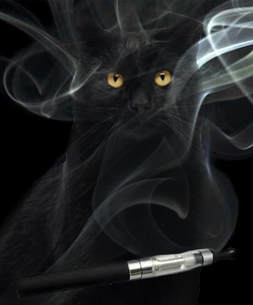
With the increasing popularity of electronic cigarettes, commonly called E-cigs, comes an increased risk of toxicity to cats whose owners use them.
Marketed as smoke-free substitutes for traditional cigarettes, they’re shaped like a long cigarette, battery operated, and filled with a replaceable cartridge of E-liquid that contains a mixture of ingredients such as nicotine, flavorings, glycerin and propylene glycol. An atomizer heats the liquid, turning it into a vapor that is then inhaled while creating a cloud that resembles cigarette smoke (a practice colloquially referred to as “vaping”).
Although their safety for humans hasn’t yet been determined, each E-cigarette cartridge contains 6 to 24 mg of nicotine, the equivalent of one to two regular cigarettes, while their enhanced flavoring and aroma make them highly attractive to cats.
The dangers of ingesting E-liquids include gastrointestinal obstruction and nicotine toxicity, while chewing on the sharp plastic can cause oral trauma. According to petpoisonhelpline.com, “the ingestion of a single cartridge can result in clinical signs and potentially death for a dog less than 10 pounds.” The same level of toxicity would also apply to a cat.
While many cats will vomit naturally after ingesting E-liquids, the signs of toxicity are dose-dependent and usually begin within 15 minutes to one hour of ingestion. When large amounts are consumed, the effects can be life threatening, but even small amounts can induce symptoms. Without treatment, nicotine toxicity can cause paralysis of the breathing muscles and cats may die, sometimes within hours.
If you’re a “vaper”, contact your vet immediately if your cat exhibits any of the following symptoms: tremors, weakness, stumbling and/or loss of coordination, depression, hyperactivity, lethargy, rapid breathing or difficulty breathing, drooling, dilated pupils, diarrhea, seizures, collapse, slow or fast heart rate and/or cardiac arrhythmias.
Of primary importance is reducing the amount of nicotine in her stomach while keeping her alive until her body breaks it down. You may be instructed to induce vomiting if you saw your cat ingest the E-liquid and she’s alert. Do NOT use antacids as the stomach acid helps decrease the absorption of the nicotine. If her exposure was dermal (her paws or fur came in contact with any spilled liquid), bathe her promptly using a mild dishwashing soap.
If however, her symptoms are severe, bring her to your vet or to the nearest emergency clinic where her stomach may be pumped (gastric lavage) and repeated doses of activated charcoal or intravenous fluids used to reduce further nicotine absorption and enhance its elimination. A ventilator may also be used to assist with her breathing until the toxins are cleared from her system. If needed, other supportive care may include oxygen and seizure control medications such as diazepam (valium.
It’s said that an ounce of prevention is worth a pound of cure, and if you’re a pet parent who “vapes”, paw-lease do so responsibly. Besides cartridges, there are also E-juice bottles, and while childproof, your cat’s needle-sharp teeth can pierce the packing. To prevent any mishaps, when not in use, all supplies and accessories MUST be locked safely away and out of reach. It’s also best to “vape” in another room or in one that’s properly ventilated – for your sake as well as hers.









 RSS Feed
RSS Feed